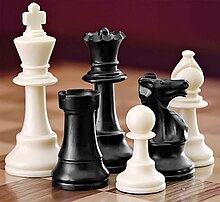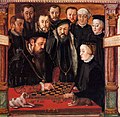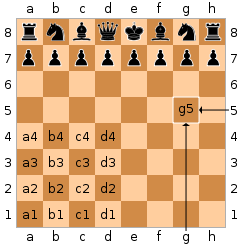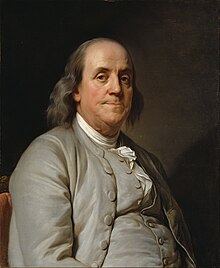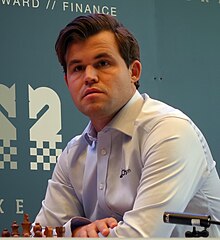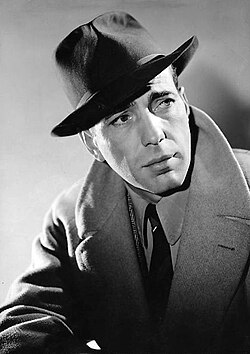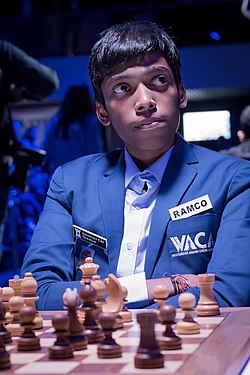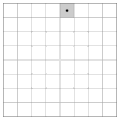Portal:Chess
Introduction
Chess is an abstract strategy board game for two players which involves no hidden information and no elements of chance. It is played on a square game board called a chessboard containing 64 squares arranged in an 8×8 grid. The players, referred to as "White" and "Black", each control sixteen pieces: one king, one queen, two rooks, two bishops, two knights, and eight pawns; each type of piece has a different pattern of movement. An enemy piece may be "captured" (removed from the board) by moving one's own piece onto the square it occupies; the object of the game is to "checkmate" (threaten with inescapable capture) the enemy king. There are also several ways a game can end in a draw.
The recorded history of chess goes back at least to the emergence of chaturanga—also thought to be an ancestor to similar games like xiangqi and shogi—in seventh-century India. After its introduction in Persia, it spread to the Arab world and then to Europe. The modern rules of chess emerged in Europe at the end of the 15th century, with standardization and universal acceptance by the end of the 19th century. Today, chess is one of the world's most popular games, with millions of players worldwide.
Organized chess arose in the 19th century. Chess competition today is governed internationally by FIDE (Fédération Internationale des Échecs; the International Chess Federation). The first universally recognized World Chess Champion, Wilhelm Steinitz, claimed his title in 1886; Gukesh Dommaraju is the current World Champion, having won the title in 2024. (Full article...)
Selected article -
José Raúl Capablanca y Graupera (19 November 1888 – 8 March 1942) was a Cuban chess player who was the third world chess champion from 1921 to 1927. A chess prodigy, he is widely renowned for his exceptional endgame skill and speed of play.
Capablanca was born in 1888 in the Castillo del Príncipe, Havana. He beat Cuban champion Juan Corzo in a match on 17 November 1901, two days before his 13th birthday. His victory over Frank Marshall in a 1909 match earned him an invitation to the 1911 San Sebastián tournament, which he won ahead of players such as Akiba Rubinstein, Aron Nimzowitsch and Siegbert Tarrasch. Over the next several years, Capablanca had a strong series of tournament results. After several unsuccessful attempts to arrange a match with then world champion Emanuel Lasker, Capablanca finally won the world chess champion title from Lasker in 1921. Capablanca was undefeated from February 10, 1916 to March 21, 1924, a period that included the world championship match with Lasker. (Full article...)
General images
Selected image
FIDE world ranking
| Rank | Player | Rating |
|---|---|---|
| 1 | 2833 | |
| 2 | 2802 | |
| 3 | 2787 | |
| 4 | 2783 | |
| 5 | 2777 | |
| 6 | 2773 | |
| 7 | 2760 | |
| 8 | 2758 | |
| 9 | 2757 | |
| 10 | 2753 | |
| 11 | 2748 | |
| 12 | 2748 | |
| 13 | 2748 | |
| 14 | 2743 | |
| 15 | 2741 | |
| 16 | 2739 | |
| 17 | 2739 | |
| 18 | 2739 | |
| 19 | 2737 | |
| 20 | 2731 |
Top 10 WikiProject Chess Popular articles of the month
Did you know...
- ... that Magnus Carlsen, the current World Chess Champion, resigned a recent tournament game after only one move?
Reviewed articles
Chess from A to Z
| Index: | A B C D E F G H I J K L M N O P Q R S T U V W X Y Z (0–9) |
| Glossary: | A B C D E F G H I J K L M N O P Q R S T U V W X Y Z |
Topics
Subcategories
Related portals
Related WikiProjects
Associated Wikimedia
The following Wikimedia Foundation sister projects provide more on this subject:
 Commons
Commons
Free media repository Wikibooks
Wikibooks
Free textbooks and manuals Wikidata
Wikidata
Free knowledge base Wikinews
Wikinews
Free-content news Wikiquote
Wikiquote
Collection of quotations Wikisource
Wikisource
Free-content library Wikiversity
Wikiversity
Free learning tools Wiktionary
Wiktionary
Dictionary and thesaurus


